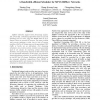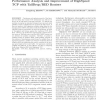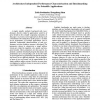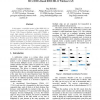111
click to vote
MASCOTS
2004
15 years 4 months ago
2004
DiffServ networks support three forwarding classes: EF, AF and BE. Scheduling algorithms based on priority queueing such as Cisco LLQ and MDRR seem to be a natural choice to provi...
117
Voted
MASCOTS
2004
15 years 4 months ago
2004
114
Voted
MASCOTS
2004
15 years 4 months ago
2004
A number of new network storage architectures have emerged recently that provide shared, adaptable and high-performance storage systems for dataintensive applications. Three commo...
144
Voted
MASCOTS
2004
15 years 4 months ago
2004
A simple, tunable, synthetic benchmark with a performance directly related to applications would be of great benefit to the scientific computing community. In this paper, we prese...
119
Voted
MASCOTS
2004
15 years 4 months ago
2004
Large archival storage systems experience long periods of idleness broken up by rare data accesses. In such systems, disks may remain powered off for long periods of time. These s...
121
Voted
MASCOTS
2004
15 years 4 months ago
2004
In this paper, a modified version of the IEEE 802.11a protocol is proposed and evaluated. We combine MultiCarrier Code Division Multiple Access (MC-CDMA), a novel, high capacity m...
115
Voted
MASCOTS
2004
15 years 4 months ago
2004
The accurate and efficient modeling of Internet worms is a particularly challenging task for network simulation tools. The atypical and aggressive behavior of these worms can easi...
93
Voted
MASCOTS
2004
15 years 4 months ago
2004
This study introduces a new analytic queuing model, the N-Burst/G/1 model with heavy-tailed service-time distribution, which captures many of the issues that affect Web servers as...
135
Voted
MASCOTS
2004
15 years 4 months ago
2004
The prominent role of the memory hierarchy as one of the major bottlenecks in achieving good program performance has motivated the search for ways of capturing the memory performa...
131
Voted
MASCOTS
2004
15 years 4 months ago
2004
IP networks do not provide any guarantee that packets belonging to the same flow are delivered in the correct order. It can be argued that out-of-order reception of packets is lim...





